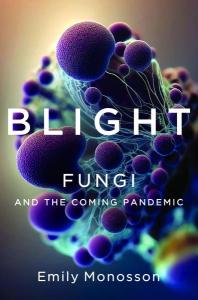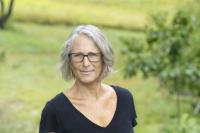
Emily Monosson—Blight: Fungi and the Coming Pandemic
FUNGI AND THE COMING PANDEMIC
Emily Monosson
W.W. Norton Press, July 18, 2023. $28.95
ISBN: 978-1324007012; ASIN: B0BHPTXXLM
Monosson reports:
Blight is about fungal pandemics across species, from trees to frogs to crops.
My first real acquaintance with a fungus-like pathogen was a disease called late blight that spread up the U.S. East Coast in 2009, devouring tomato plants. The devastation was shocking. Late blight returned and returned and remains a problem today. The same organism contributed to the Irish Potato Famine.
A few years later, several scientists published an article in Nature titled “Emerging Fungal Threats to Animal, Plant and Ecosystem Health.” They were ringing a warning bell: fungal and fungus-like pathogens can be catastrophic, not just for crop plants but also for wildlife, forests and in some cases humans. I wrote a proposal on the topic but later decided to write a different, more hopeful book.
Over the years the fungus problem not only didn’t go away, but worsened: dozens of frog species went extinct, millions of bats died, iconic pines were dying across the western mountains. Scientists still were ringing that bell. In the spring of 2019, I wrote a new proposal and found an agent, who sold the book to W.W. Norton.I intended to travel and interview scientists in the field, but COVID arrived. Almost all interviews were over Zoom. I also relied on primary literature and other publications which, if not available through open access (and many were not), I acquired through the University of Massachusetts, where I hold an adjunct faculty position. I am grateful to the University for that: too many scientists and writers do not have easy access to primary literature.
One thing I swore I would do better this time around was to keep better track of information: interviews, citations, notes, out-takes. I used a spreadsheet and Mendeley but if there is a next time, I will (I hope) do even better. While I checked and rechecked facts and figures, I wish I had thought to hire a fact-checker.
Finally, the one chapter I thought was key ended up being distributed throughout the book. My advice to new authors: remain flexible, track your info, and consider hiring a fact-checker for peace of mind.
Contact info:
- Emily Monosson: 413-522-1937, emonosson@gmail.com, https://www.linkedin.com/in/emily-monosson-41bb205/
- Book: BLIGHT: Fungi and the Coming Pandemic
- Publicist: Will Scarlett, wscarlett@wwnorton.com
- Agent: Michelle Tessler, michelle@tessleragency.com
NASW members: will your book be published soon? Promote it by submitting your report for Advance Copy.
Tell your fellow NASW members how you came up with the idea for your book, developed a proposal, found an agent and publisher, funded and conducted research, and put the book together. Include what you wish you had known before you began working on your book, or had done differently.
See https://www.nasw.org/advance-copy-submission-guidelines.
View Advance Copy archives at https://www.nasw.org/member-article/advance-copy.
Thinking of writing a book? If you are a NASW member, you may access a list of more than 200 books and online resources to help you craft your book proposal, find an agent and funding sources, negotiate your contract, learn about self-publishing, publicize and market your book, and more at https://www.nasw.org/article/write-book.
Send book info and questions about book publishing to Lynne Lamberg, NASW book editor, llamberg@nasw.org.
Follow @LynneLamberg on Twitter for news about science/medical books, writing, and NASW authors.
Banner image adapted from original photo by Emily Monosson.
NASW members: Share photos of your office bookshelves for use on our website. Upload photos to bit.ly/naswpicsubmit.
Advance Copy
The path from idea to book may take myriad routes. The Advance Copy column, started in 2000 by NASW volunteer book editor Lynne Lamberg, features NASW authors telling the stories behind their books. Authors are asked to report how they got their idea, honed it into a proposal, found an agent and a publisher, funded and conducted their research, and organized their writing process. They also are asked to share what they wish they’d known when they started or would do differently next time, and what advice they can offer aspiring authors. Lamberg edits the authors’ answers to produce the Advance Copy reports.
NASW members: Will your book be published soon? Visit www.nasw.org/advance-copy-submission-guidelines for information on submitting your report.
Publication of NASW author reports in Advance Copy does not constitute NASW's endorsement of any publication or the ideas, values, or material contained within or espoused by authors or their books. We hope this column stimulates productive discussions on important topics now and in the future as both science and societies progress. We welcome your discussion in the comments section below.


